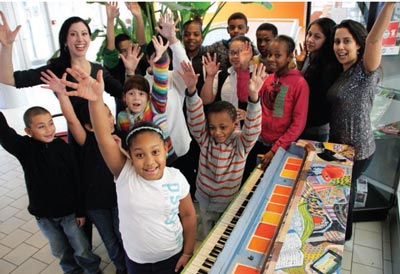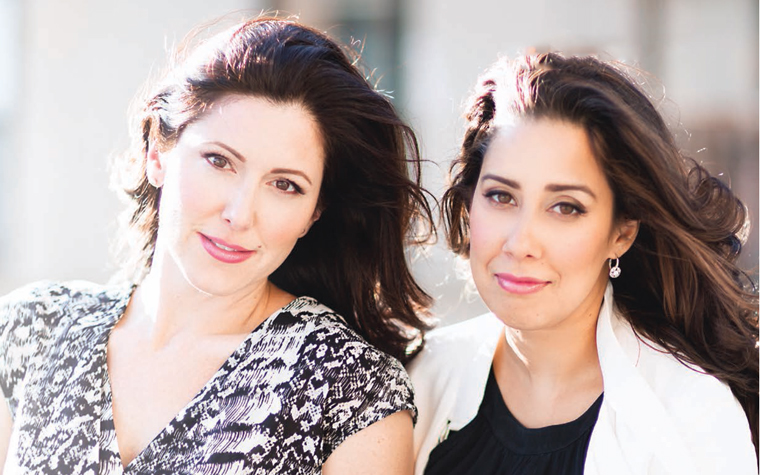Monica Yunus and Camille Zamora are bringing people together through music
When acclaimed American sopranos Monica Yunus and Camille Zamora first met as opera stu- dents at Juilliard in the early 2000s, they not only bonded over their shared joy of music, but they also discovered they both wanted to contribute to their communities on a deeper level.
“Our hearts resonated with questions around the role that the arts could play in the capacity of healing,” Zamora says.
As fate would have it, when the horrific events of 9/11 transpired, Yunus and Zamora responded immediately by gathering a group of their friends to perform at Juilliard’s local firehouse, which had lost 12 of its 13 firefighters that morning. Singing for frontline heroes and their families, and nursing homes, witnessing how moved they were, the two friends recognized the strong impact that the arts could have in society, especially in times of crisis.
“Both of us had a desire to bring the excellence that we were cultivating in our tiny practice rooms at Juilliard to as many communities as possible, and to forge new creative connections,” Yunus explains.
And so, in 2006, at the beginning of their blossoming operatic careers, Yunus and Zamora co- founded Sing for Hope (SFH), a New York–based nonprofit organization dedicated to harnessing “the power of the arts to create a better world.” With an annual budget of $3 million, today, SFH brings a multitude of creative-arts-based programs to hundreds of thousands of people in hospitals, nursing homes, schools, transit hubs, treatment centers, community spaces, and refugee camps in the United States and worldwide.
New York residents have likely spotted SFH’s most visible initiative—the artist-designed Sing for Hope Pianos—popping up outdoors for all
to play in high-traffic public spaces around the city, including Central Park, the New York Public Library, and the Coney Island boardwalk. To date, there have been more than 500 hand-painted pianos placed across the five boroughs.
“We have such a wide array of people enjoying our pianos, from homeless people who play beautiful- ly to lawyers who sound like concert pianists and everything in between,” Yunus remarks. “It’s a way for people to stop—which in New York doesn’t happen very often—and connect with one another.”
Zamora adds, “It’s about how we can use the arts in public spaces to drive harmony and social cohesion.”

After the Sing for Hope Pianos make their public debut each year, they move on to their permanent homes in hospitals and schools, where Sing for Hope’s roster of musicians brings the unique piano artworks to life with inspiring performances, classes, and community workshops. Sing for Hope’s artists hail from the stages of Broadway to The Metropolitan Opera, and they share their talents and hearts directly with the community at large and with those in need.
Despite being in separate locations (Zamora lives in New York City and Yunus resides in Pittsburgh), when talking about their organiza- tion, the partners speak as one, finishing each other’s sentences. Not all friends can work together seamlessly, but Yunus and Zamora’s aligned vision helps keep Sing for Hope on track. Splitting their time between their community outreach work and their busy performance careers doesn’t faze these two women.
“Whether singing in an opera onstage or guiding SFH’s music workshops for isolated seniors and hospital patients, it’s all about how the arts inspire joy, resilience, and hope,” says Yunus.

While Yunus and Zamora grew up in different parts of the country, their love of singing began as children and they were very fortunate to have supportive parents who helped nurture their young, powerful voices. Understanding the importance of community and social justice was also a large part of their upbringing.
Yunus was born in Bangladesh to Vera Forostenko, a social worker, and Muhammad Yunus, an economist and Nobel Peace Laureate (2006) best known for being the founder of Grameen Bank, a financial institution that provides microloans. After her parents divorced, Yunus moved with her mother to Jackson, New Jersey. It was not long before Yunus’s mother recognized her daughter’s unique talent; Yunus began singing at her grandmother’s Russian Orthodox church, and at the age of 11 made her debut onstage with the children’s chorus at The Metropolitan Opera.
Zamora grew up in Texas with her parents, Lois and Stephen Zamora, and younger brother, Peter. She remembers singing all the time.
“I love watching Monica’s little boy being super-musical these days—I was also that musi- cal person when I was a child, singing nonstop!” Zamora says.
She feels very lucky to have attended Hous- ton’s public Kinder High School for the Perform- ing and Visual Arts, where her “music nerd self ” was able to truly blossom. Even as a teen, she was equally committed to social justice, something instilled in her by her late father, who was the first Hispanic dean of a law school in the state of Texas. Zamora describes her father as a “justice fighter.”
In addition to being co-executive directors at Sing for Hope, Yunus’s and Zamora’s individual singing careers in concerts, in recitals, and on the operatic stage are equally impressive. Zamora’s repertoire ranges from Mozart to tango, and she has collaborated with artists such as Sting, Yo-Yo Ma, and The Mambo Kings. Her recent album of classic Spanish songs, If the Night Grows Dark, debuted on Billboard’s Classical Chart Top Ten.
Like her friend, Yunus has also appeared on stages all over the world, with regular performanc- es as a principal artist at The Metropolitan Opera. She has appeared with renowned singers such as Andrea Bocelli, José Carreras, and Bryn Terfel, and has given special performances at the United Nations and the Fortune Most Powerful Women Summit. Both women are also in demand for their keynoting and thought leadership, with upcoming residencies that include FSU’s 2021 Housewright Eminent Scholars.
Being creative and resilient at the same time has served Yunus and Zamora well during these uncer- tain times—a global pandemic is a surefire way to test any organization. Sing for Hope has swiftly pivoted its model of in-person programming and group concerts to providing socially distant performances for frontline healthcare workers as well as virtual performances and programming for individuals who are isolated.
With Broadway temporarily closed along with other great concert halls everywhere, SFH has decided to repay its artists who were so giving of their time pre-COVID. An innovative fundraising initiative just launched, SingforHopeGrams, now brings the talents of these stars to everyone through a Zoom link or telephone call.
“At the end of the day, we all still need connection,” Yunus says.
SFH is fortunate to receive funding froma combination of leading philanthropists and foundations, including Dr. Haruhisa Handa, International Foundation for Arts and Culture, John and Jody Arnhold, the Thea Petschek Iervolino Foundation, the Kellen French family, and Ann Ziff, who is well known for her significant contribution to the arts.
Many of SFH’s board members are influential individuals in their own right, including renowned tenor Andrea Bocelli, Grammy Award–winning soprano Renée Fleming, and Jon Batiste, Grammy- nominated musician and bandleader of The Late Show with Stephen Colbert. Yunus counts her father, who is an SFH board member, as one of the important mentors who have helped along the way.
“Dr. Yunus is a particular kind of amazing human and such a global figure,” Zamora chimes in. “And, of course, his boldness of thought has played a key role in SFH’s evolution, encouraging us to think big and not shy away from challenges.”
Yunus and Zamora envision a future where artists will have a leadership role to play in the areas of healing, education, and social cohesion, and where all people will have opportunities to fully develop their creative potential.
“It is our dream that, over time, all artists will be able to use their talents to benefit schools, hospitals, hospices, and end-of-life care. It’s about following the trajectory of life,” says Zamora.
Yunus continues, “Now more than ever, it’s about the myriad ways in which the arts drive value in society. How artists, institutions, philanthropy, and businesses position themselves during and post-COVID will determine the well-being of our arts ecosystem and our communities. This is a moment to be bold and creative, and to invest in the future.”
This article by Rena Godfrey appeared in the Pre-Spring 2021 issue of Lifestyles Magazine.
Photos courtesy of Sing for Hope
